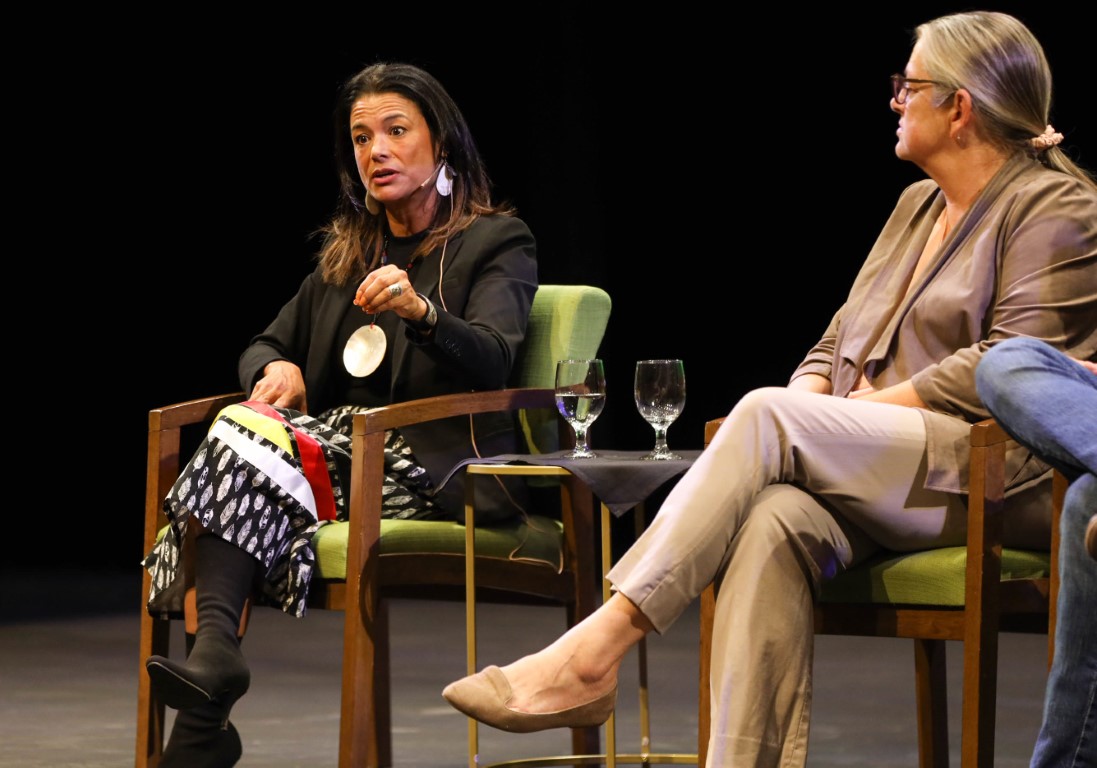A panel of experts on Bay Area Indigenous history was joined by Charlene Nijmeh, chairwoman of the Muwekma Ohlone tribe, to discuss the tribe’s long and ongoing struggle for federal recognition, efforts to re-establish themselves on tribal lands and the current threat they face from gentrification at the first event of the 2023-24 Harker Speaker Series, held at the Patil Theater.
Assistant head of school Jennifer Gargano and Muwekma Ohlone chief of staff Matthew Ricchiazzi each delivered opening remarks. Michael Wilcox, professor of anthropology at Stanford University and the Muwekma Ohlone tribe’s tribal historic preservation officer, then took the podium to share the tribe’s long and enduring history and discuss how anthropological scholarship had misrepresented Indigenous history.
His presentation proceeded to debunk long-held myths about Indigenous people, including “terminal narratives” about disease and military conquest. “The idea is that once that happens, Native people disappear. Not true,” said Wilcox, who is of Yuman descent. “We stick around, and we get angry.”
Wilcox also briefly traced the history of the Muwekma Ohlone, which extends back at least 10,000 years. However, due to poor scholarship and record-keeping, the Muwekma were not contacted in the 1850s when some tribal lands were returned.
Lee Panich, chair of Santa Clara University’s anthropology department, recapped the Muwekma Ohlone’s long-running struggle to receive federal recognition, beginning with the establishment of California missions, where California Natives were forcibly displaced and put to work. They were allowed to return to their villages when the missions realized the land they were on was not ideal for agriculture.
The Muwekma (then identified as the Verona Band) eventually received federal recognition, but in 1927 the Sacramento Bureau of Indian Affairs did not purchase land for the Muwekma tribe, which started an ongoing bureaucratic struggle for recognition.
“They’re not being consistent with the evidence they’ll allow,” said Panich. “For instance, the attendance at Indian boarding schools for some tribes in this situation is considered evidence of political continuity as a tribe, but in Muwekma’s case, they’re not allowing that.”
Stanford University archaeologist Laura Jones talked about the Muwekma Ohlone as a “living, social and political unit.” After summarizing the hardship Indigenous people faced under missionization, Jones explained that for a brief period in the mid-1800s, Muwekma people lived in communities called rancherias that were established in various parts of the Bay Area. More displacement occurred when Mexican land was being sold off to American settlers around 1860.
Today, Jones said, Muwekma Ohlone people are again being forced out of their ancestral land by gentrification. To combat this process, Jones said she supports the Land Back movement, but cautioned that “it has a poison pill in it that we have to be really careful about,” namely the costs associated with managing land, which could lead to “dumping” land that can’t be developed on to Indigenous communities as a public relations maneuver.
“What [Indigenous people] really need is allowing them to live on their conservation lands,” she said. “Not just steward nature preserves that we walk through and look at butterflies on. Survival of Indigenous communities and their native natural habitat requires sovereignty and economic development and affordable housing.”
The final speaker, tribe chairwoman Nijmeh, began by greeting the audience in Chochenyo, the language spoken by the Muwekma Ohlone tribe. She elaborated on the tribe’s struggle to achieve federal recognition.
“We have already spent 43 years proving our existence to the government that does not want to acknowledge our existence,” she said. “We have supplied irrefutable evidence tracing the origins and continuity of our ancestors from our villages before the Spanish arrived to enslave us to the time of the Americans who try to exterminate us to present day.” An example of this evidence, she mentioned, is a genomic study that traced living tribal members to a Bay Area village site that is 2,500 years old.
The continued refusal to recognize the tribe, Nijmeh said, is a deliberate maneuver to maintain control of valuable land. “Make no mistake, if Muwekma’s aboriginal lands were not in the San Francisco Bay Area, we would already be recognized,” she said.
She also accused Bay Area congressmembers of making the issue of recognition about casino gaming. “Federal recognition isn’t about gaming,” she argued. “It’s about keeping our people on our 10,000-year homeland. Federal recognition, she continued, would allow the tribe to build on their ancestral land.
To escalate this effort, Nijmeh then announced that she plans to enter the 2024 Congressional race, challenging 30-year incumbent Zoe Lofgren. “It was not an easy decision for me, and it will be an enormous challenge, but one I felt is very necessary to make impactful change from the inside and to combat the special interests and influence over congressmen and women in the Bay Area,” she said.
Following her talk, the panel took questions from the audience.
